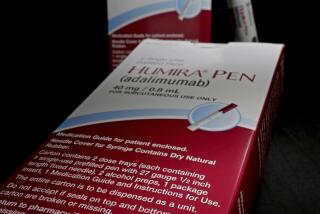RJR Nabisco Rolls Out Fat Substitute Salatrim
- Share via
Despite the notable failure of others to cook up a successful fake fat, RJR Nabisco Holdings on Monday introduced a low-calorie fat substitute that can be used in a wide variety of foods.
RJR Nabisco’s product--Salatrim, which is made from vegetable oils and other foods--joins a long list of other fat substitutes concocted by companies such as Procter & Gamble and Monsanto. Most of those fake fats have failed to win the approval of either government regulators or consumers’ taste buds.
But Nabisco--looking at using Salatrim in its products, which include Oreo cookies and Ritz crackers--says it can avoid the failure of its competitors.
Sales of fat substitutes, currently less than $100 million annually, could reach as much as $1 billion, according to some estimates.
Nabisco officials say Salatrim comes closer than competing products to imitating the richness and texture of fat. However, a gram of Salatrim contains five calories--more than half those of real fat. That’s because it is only partly absorbed by the body.
Since Salatrim is not considered a synthetic compound, the Food and Drug Administration has accepted a Nabisco petition to have it included on a list of substances the federal agency considers “generally recognized as safe.”
As a result, Nabisco and its partner in the product, Pfizer Inc., can start selling Salatrim as they await the FDA’s final say--avoiding the years of delay that have held up some rival fake fats.
“By mid-1995, consumers can expect to see it in products,” said Hank Sandbach, a Nabisco Foods Group spokesman.
Pfizer, which has also developed its own fat substitute, and Nabisco see a broad range of potential uses for Salatrim.
While Pfizer tries to sell it to other companies, Nabisco has the exclusive right to use Salatrim in cookies, crackers, salty snacks and margarine in North America for five years.
But the past failures of other food giants’ fake fats leave many industry analysts doubtful.
Procter & Gamble, for example, has watched its lead over rivals disappear in the seven years since submitting its Olestra synthetic fat to the FDA for testing and approval.
The FDA considers Olestra, unlike Salatrim, a new substance that therefore needs more intensive safety studies than a product derived more directly from natural ingredients, according to George Pauli, director of the FDA product policy division.
Monsanto’s NutraSweet division introduced its all-natural Simplesse fat substitute in 1988. Like Salatrim, Simplesse was categorized by the FDA as “generally recognized as safe” in frozen desserts. But slow sales led Monsanto this year to discontinue Simple Pleasures ice cream, its flagship brand containing Simplesse.
“It’s well known (that Simplesse products) haven’t been nearly the market success that NutraSweet hoped,” said Gail Greenwald, managing director at Arthur D. Little Inc. in Cambridge, Mass.
More to Read
Inside the business of entertainment
The Wide Shot brings you news, analysis and insights on everything from streaming wars to production — and what it all means for the future.
You may occasionally receive promotional content from the Los Angeles Times.










